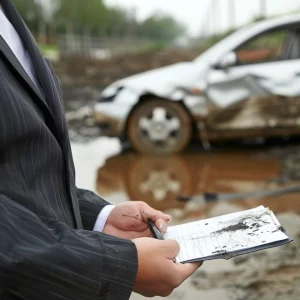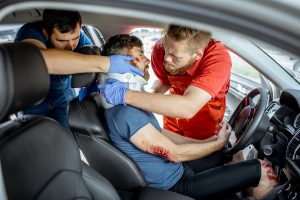Introduction
Accidents involving police vehicles can be both confusing and intimidating for victims. The process of seeking compensation for injuries and damages may seem daunting, as it requires going up against a government entity. However, by seeking the assistance of a skilled police car injury attorney, you can ensure that your legal rights are protected and that you receive the compensation you deserve. This article will cover the various aspects of accidents involving law enforcement vehicles, the legal process, and the importance of hiring an experienced attorney to handle your case.
Types of Accidents Involving Police Vehicles
There are various types of accidents involving police vehicles, including:
1. High-speed pursuits
High-speed pursuits are among the most dangerous types of police car accidents. In these situations, a police officer is chasing a suspect at high speeds, often through densely populated areas. This can lead to severe accidents involving innocent bystanders or other drivers on the road.
2. Responding to emergencies
Police officers often need to respond quickly to emergencies, which can result in accidents. These accidents may occur when a police car is traveling at high speeds or going through intersections against traffic signals.
3. Improper vehicle maintenance
Police departments are responsible for maintaining their vehicles, but sometimes they fail to do so adequately. This can result in equipment failure or malfunction, leading to accidents on the road.
4. Distracted driving
Like any other driver, police officers can become distracted while driving. This can lead to accidents caused by inattention or failure to notice other vehicles or pedestrians.
5. Reckless driving
In some cases, police officers may engage in reckless driving, which can cause accidents. This may include excessive speeding, dangerous maneuvers, or failure to use appropriate warning devices such as sirens and lights.
Legal Rights and Responsibilities in Police Car Accidents
When a police vehicle is involved in an accident, the legal rights and responsibilities of the parties involved can be more complex than in a typical car accident. Some key factors to consider include:
1. Sovereign immunity
In many cases, government entities such as police departments are protected by a legal concept known as “sovereign immunity.” This means that they may be immune from liability in certain situations. However, this does not mean that victims have no recourse. In many states, specific laws allow for claims against government entities in cases of negligence or wrongdoing.
2. Standard of care
The standard of care for police officers is generally higher than that of ordinary drivers. This means that they are held to a higher level of responsibility when it comes to operating their vehicles. In some cases, this may make it easier for victims to establish negligence on the part of the police officer involved in the accident.
3. Special duty rule
In some cases, police officers may be found to have a “special duty” to protect specific individuals from harm. This can occur when a police officer is directly involved in protecting or assisting someone, such as in a high-speed chase or during an emergency response. If a police officer fails to uphold this special duty, they may be found liable for any resulting injuries or damages.
Steps to Take After a Police Car Accident
If you are involved in an accident with a police vehicle, it is essential to take certain steps to protect your legal rights and ensure that you have the best chance of receiving compensation for your injuries and damages. These steps include:
1. Seek medical attention
Your health should be your top priority after an accident. Seek immediate medical attention for any injuries you have sustained, even if they seem minor at the time. This will not only ensure that you receive the necessary treatment but will also help to document the extent of your injuries.
2. Report the accident
Contact the police to report the accident, even if the other party involved is a police officer. This will ensure that an official record of the incident is created, which can be crucial for your case.
3. Gather evidence
Collect as much evidence as possible from the scene of the accident. This may include photographs of the vehicles involved, the accident scene, and any injuries you have sustained. Additionally, gather contact information for any witnesses who may have seen the accident occur.
4. Keep records
Keep detailed records of any medical treatment you receive, as well as any expenses related to the accident, such as vehicle repairs or lost wages. These records will be crucial in supporting your claim for compensation.
5. Consult with an attorney
An experienced police car injury attorney can help guide you through the often complex legal process involved in accidents with law enforcement vehicles. They can help you understand your rights, gather necessary evidence, and represent you in negotiations or court proceedings.
The Role of a Police Car Injury Attorney
A skilled police car injury attorney can play a crucial role in helping you receive the compensation you deserve after an accident involving a law enforcement vehicle. Some of the key ways that they can assist you include:
1. Investigating the accident
Your attorney will conduct a thorough investigation of the accident, gathering evidence such as police reports, witness statements, and photographs. This will help to build a strong case in support of your claim.
2. Determining liability
An experienced attorney will be able to determine who is liable for the accident and whether any special legal protections apply, such as sovereign immunity or special duty rules.
3. Calculating damages
Your attorney will help you determine the full extent of your damages, including medical expenses, lost wages, pain and suffering, and other relevant costs. This will help to ensure that you receive the compensation you deserve.
4. Negotiating with insurance companies
In many cases, insurance companies will attempt to settle claims for less than their full value. Your attorney can represent you in negotiations with insurance companies, ensuring that you receive fair compensation for your injuries and damages.
5. Representing you in court
If your case goes to court, your attorney will represent you throughout the legal process, presenting evidence and arguing on your behalf.
Conclusion
Accidents involving police vehicles can be complex and intimidating, but by working with an experienced police car injury attorney, you can ensure that your legal rights are protected and that you receive the compensation you deserve. With their expertise and guidance, you can navigate the legal process with confidence and focus on what truly matters: your recovery.












